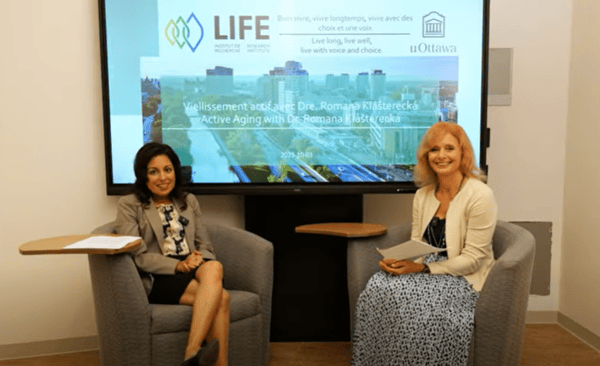Watch the new documentary “Dementia: You Can Make A Difference” by Peabody Award winner Firdaus...


Watch the new documentary “Dementia: You Can Make A Difference” by Peabody Award winner Firdaus...

Watch episode 4 of the LIFE Research Institute’s video capsule series, where Dr. Ben Tsang, a...

Watch Episode 1 of the Life Research Institute's video capsule, as it casts the spotlight on an...

The field of aging research is gaining prominence as the global population experiences a gradual...
Enhancing Dementia Care: A Pioneering Project on Linked Information for Care Partners
The LIFE Research Institute, dedicated to promoting healthy living and aging, recently had the privilege of hosting Dr. Annie Robitaille, Assistant Professor at the Interdisciplinary School of Health Sciences at the University of Ottawa. Dr. Robitaille, also the holder of the Research Chair at Perley Health Center for Excellence, discussed a groundbreaking project during an interview with Dr. Nafissa Ismail on the institute's YouTube channel. The initiative, titled "Health Surveillance of Persons Living with Dementia and Care Partner Dyads," addresses the critical need for comprehensive, linked data on individuals living with dementia and their care partners.
The Project Overview
Dr. Robitaille began by shedding light on the genesis of the project, emphasizing the scarcity of data that links information from persons living with dementia with that of their care partners, particularly over time and at a national level. The project, funded by the Public Health Agency of Canada, is a pioneering pilot initiative. It involves linking de-identified electronic medical record data from persons living with dementia and their care partners through the primary care sentinel surveillance network data.
The Emerging Database
As of now, the project is in the early stages of building a comprehensive database that encompasses de-identified information on people living with dementia and their care partners. Dr. Robitaille envisions the database growing over time, potentially becoming available to other researchers. Furthermore, the project aims to explore connections with additional electronic and administrative databases across Canada, creating a more holistic understanding of the challenges and experiences faced by those involved in dementia care.
The Significance of Linked Information
In response to Dr. Ismail's query about the importance of having linked information on people living with dementia and their care partners, Dr. Robitaille underscored the integral nature of their relationship. While individual data on each party exists, understanding the interconnectedness and dynamics of this relationship is crucial. The life experiences, health needs, and challenges faced by both persons living with dementia and their care partners play a pivotal role in the dementia journey. The project seeks to address this gap by providing a longitudinal view, enabling researchers and healthcare professionals to gain insights that can positively impact dementia care.
If you're as inspired by this discussion as we are, check out the full video on the LIFE Research Institute's YouTube channel.
By LIFE Research Institute
Ageing begins at birth and is our response to the multitude of factors and influences faced throughout our life trajectories. The LIFE Research Institute assembles researchers and partners with diverse perspectives who work collaboratively to understand how we are guided along the unexpected trajectories of life. We expect this knowledge will transform how we view the roles for individuals and society in ageing and create new opportunities for life fulfillment and well-being. We want to inspire individuals to live the longest, best lives possible honouring the many varied choices along the way.Also Read